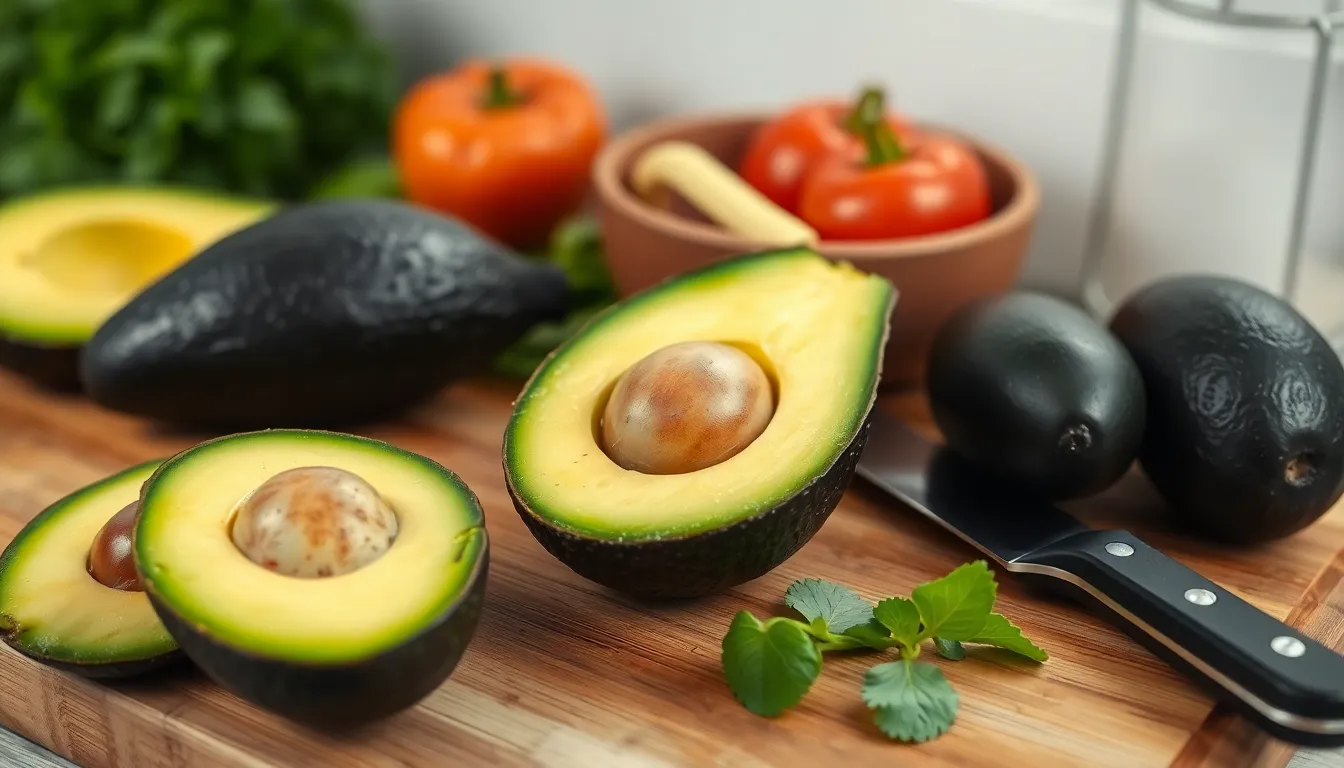Avocados are often celebrated for their creamy texture and healthy fats, but they also bring a surprising twist to the table: protein. As more people embrace plant-based diets, understanding the protein content in various foods becomes essential. Avocados, while not a traditional protein source, still contribute to daily intake in a unique way.
In this article, readers will discover just how many grams of protein are packed into this beloved fruit. Whether it’s for enhancing a smoothie, topping a salad, or spreading on toast, knowing the protein content can help individuals make informed choices about their nutrition. Dive in to learn more about avocados and their role in a balanced diet.
Table of Contents
ToggleUnderstanding Avocado Nutrition
Avocados provide a unique blend of nutrients that contribute to overall health. Their nutritional profile includes healthy fats, vitamins, and a modest amount of protein.
Overview of Nutritional Profile
Avocados contain approximately 2 grams of protein per 100 grams. Their nutritional breakdown includes:
| Nutrient | Amount per 100g |
|---|---|
| Calories | 160 |
| Protein | 2 grams |
| Total Fat | 15 grams |
| Carbohydrates | 9 grams |
| Fiber | 7 grams |
| Vitamin K | 26% DV |
| Folate | 20% DV |
| Vitamin C | 17% DV |
Avocados consist mainly of healthy monounsaturated fats, which benefit heart health. They are low in carbohydrates, making them suitable for low-carb diets. Fiber content supports digestive health, contributing 28% of the daily value (DV) in a 100-gram serving.
Health Benefits of Avocado
Avocados offer several health benefits:
- Heart Health: The monounsaturated fats reduce bad cholesterol levels, promoting heart health.
- Nutrient Absorption: Fat-soluble vitamins, such as A, D, E, and K, absorb better when paired with healthy fats found in avocados.
- Digestive Health: The high fiber content aids digestion, promoting regular bowel movements.
- Weight Management: Healthy fats and fiber provide satiety, helping control hunger and support weight management.
- Anti-Inflammatory Properties: Avocados contain antioxidants that combat inflammation and oxidative stress.
Incorporating avocados into various dishes enhances nutritional profiles while delivering essential health benefits.
Protein Content in Avocado

Avocados contain notable, yet modest, amounts of protein. Understanding their protein content aids in dietary planning for those seeking plant-based nutrition sources.
How Many Grams of Protein in Avocado?
Avocados provide approximately 2 grams of protein per 100 grams. This amount contributes to their overall nutritional value and complements their role as a source of healthy fats and fiber. Including avocado in meals enhances both protein intake and overall dietary quality, making it a versatile option for various dishes.
Comparison with Other Protein Sources
| Food Item | Protein Content (per 100 grams) |
|---|---|
| Chicken Breast | 31 grams |
| Lentils | 9 grams |
| Quinoa | 4 grams |
| Greek Yogurt | 10 grams |
| Avocado | 2 grams |
Avocados offer lower protein levels compared to other high-protein foods like chicken or lentils. However, their unique blend of nutrients still makes them beneficial in a balanced diet. Pairing avocados with higher protein sources can create a well-rounded meal.
Factors Affecting Protein Content
Several factors influence the protein content in avocados, impacting their nutritional value. Key considerations include the variety of avocado and their ripeness and preparation methods.
Variety of Avocado
Different avocado varieties have varying protein levels. The most common types, Hass and Fuerte, contain approximately 2 grams of protein per 100 grams. Lesser-known varieties, like Bacon and Pinkerton, may exhibit similar protein ranges. Selecting avocado types based on desired nutritional profiles can enhance dietary benefits.
Ripeness and Preparation Methods
Ripeness significantly affects the protein content in avocados. Riper avocados may show slight variations in nutrient density, including protein. Cooking methods can also alter nutrient profiles; for instance, grilled or baked avocados may yield different protein measurements compared to raw ones. Incorporating avocados into meals through diverse preparation methods allows for maximizing their nutritional potential while maintaining protein levels.
Incorporating Avocado in Your Diet
Avocados add unique flavors and textures to meals while contributing essential nutrients, including protein. Their versatility allows incorporation into various dishes, enhancing both taste and health benefits.
Recipe Ideas for Protein Boost
- Avocado Toast: Spread mashed avocado on whole grain bread and top with a poached egg for added protein.
- Smoothies: Blend avocado with Greek yogurt, spinach, and protein powder for a creamy, nutrient-dense drink.
- Salads: Add diced avocado to salads with legumes, such as chickpeas or black beans, to increase protein content.
- Guacamole: Prepare guacamole with Greek yogurt mixed in, boosting protein levels while maintaining flavor.
- Stuffed Avocados: Fill halved avocados with tuna, chicken salad, or quinoa salad to create a protein-rich meal option.
Serving Suggestions
- Snack Pairing: Serve avocado slices with whole grain crackers or vegetable sticks and hummus for a nutritious snack.
- Breakfast Bowls: Incorporate avocado into breakfast bowls with eggs, beans, and salsa for a balanced start to the day.
- Wraps: Use avocado as a filling in wraps with lean protein sources, such as turkey or salmon, along with fresh vegetables.
- Dips: Create a protein-packed dip by blending avocado with cottage cheese or lentils for a healthy snack option.
- Tacos: Fill corn tortillas with avocado, black beans, and grilled chicken for a satisfying meal with protein.
Avocados stand out not just for their creamy texture but also for their impressive nutritional profile. With around 2 grams of protein per 100 grams they offer a unique combination of healthy fats vitamins and fiber that supports a well-rounded diet.
While they may not be the highest source of protein compared to other foods incorporating avocados into meals can enhance both flavor and nutritional value. Whether it’s on toast in smoothies or as part of a salad avocados provide essential nutrients that contribute to overall health.
By understanding their protein content and health benefits individuals can make informed choices that elevate their dietary habits.


